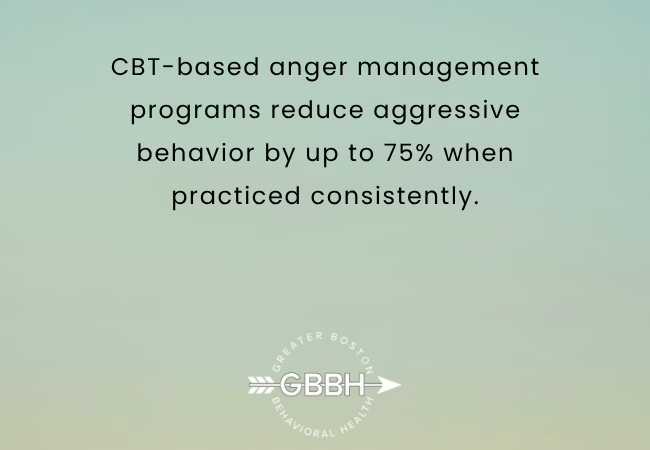For many people, anger feels like a storm they can’t escape—intense, unpredictable, and often damaging. Whether it erupts in shouting matches or simmers as resentment, unmanaged anger can take a toll on relationships, careers, and mental health. But here’s the truth: anger is manageable, and healing is possible.
At Greater Boston Behavioral Health, we’ve seen clients go from daily outbursts to emotional clarity through our anger management therapy in Massachusetts. By combining therapeutic techniques like Cognitive Behavioral Therapy (CBT) with the structured support of our Partial Hospitalization Program (PHP) and Intensive Outpatient Program (IOP), we’ve helped hundreds regain control.
In this blog, we’ll share real stories of transformation—examples of how individuals have shifted from chaos to calm—and explore how anger management therapy truly works.
Real-Life Stories: Transformation Through Therapy
Jason, 35 – From Explosive to Empowered
The Challenge: Jason’s outbursts at work and home were costing him friendships, promotions, and his marriage.
The Turning Point: Referred to our Intensive Outpatient Program in Massachusetts, Jason began CBT-based anger management sessions. Through identifying his triggers and distorted thoughts like “They’re always against me,” he started to change his internal narrative.
The Outcome: Six weeks into IOP, Jason was using breathing techniques, journaling, and assertive communication. His relationships stabilized, and he was promoted within six months.
Maria, 42 – Healing Trauma to Release Rage
The Challenge: Maria struggled with long-standing anger rooted in childhood trauma. Her emotional volatility strained her role as a mother.
The Turning Point: Enrolled in our Partial Hospitalization Program Massachusetts, she received daily therapy including trauma-informed care, CBT, and mindfulness training.
The Outcome: Maria learned to distinguish between past and present, identifying when trauma was driving her anger. Today, she leads a support group for women healing from emotional abuse.
Kyle, 19 – A College Student Facing Legal Trouble
The Challenge: After a physical altercation in school, Kyle was court-ordered to undergo anger management.
The Turning Point: Kyle attended structured anger management therapy sessions through our outpatient services. He worked with a therapist on emotional regulation, triggers, and role-playing difficult scenarios.
The Outcome: Kyle not only avoided further legal consequences, but he became a peer mentor in his campus mental health group.
Why Anger Management Therapy Works
Therapy for anger management isn’t about “stuffing” emotions. It’s about:
- Identifying root causes (past trauma, anxiety, depression, stress)
- Learning emotional regulation tools
- Challenging automatic negative thoughts
- Improving communication and problem-solving
Techniques like CBT, Dialectical Behavior Therapy (DBT), and mindfulness help clients replace reaction with reflection.
The Connection Between Mental Health and Anger
Anger rarely exists in isolation. Often, it is a symptom of underlying mental health conditions such as:
-
Anxiety disorders – where constant tension can lead to irritability
-
Depression – especially when sadness masks itself as anger
-
PTSD – where triggers create intense emotional reactions
-
Bipolar disorder – where mood swings include agitated, angry phases
At Greater Boston Behavioral Health, we recognize these connections and ensure that clients in Anger Management Therapy Massachusetts also receive support through our integrated Mental Health Programs in Massachusetts, including diagnostic evaluation and medication management when necessary.
When Is It Time to Seek Help for Anger?
If you’re unsure whether you—or a loved one—need professional support for anger, consider these signs:
-
Frequent arguments that escalate quickly
-
Physical aggression or breaking objects
-
Trouble at work or school due to behavior
-
Legal issues related to outbursts
-
Feelings of shame, guilt, or isolation after episodes
-
Loved ones walking on eggshells around you
-
Difficulty calming down once upset
If these resonate, it may be time to explore care through an Intensive Outpatient Program in Massachusetts or our structured Partial Hospitalization Program Massachusetts, both of which offer targeted anger management therapy and holistic support.
What Success Looks Like in Anger Recovery
Success in anger management isn’t just about “not yelling.” It’s about:
-
Recognizing emotions before they escalate
-
Choosing healthy outlets instead of impulsive reactions
-
Feeling in control—even when challenged
-
Building stronger relationships through honest communication
-
Living without the constant aftermath of regret
Many clients describe the journey as “getting their life back”—a renewed ability to connect with loved ones, hold jobs, and feel proud of their emotional growth. And at Greater Boston Behavioral Health, we celebrate those wins every step of the way.
How Our Programs Support Change
Partial Hospitalization Program Massachusetts
Ideal for individuals needing structured, daily support without overnight stays. PHP includes individual and group therapy, psychiatric care, and wellness planning.
Intensive Outpatient Program Massachusetts
For those balancing life and recovery, our IOP provides flexibility, offering therapy several times per week.
Inpatient & Residential Programs
When anger is linked to co-occurring disorders or trauma, our residential programs offer 24/7 care in a safe, supportive environment.
Tools That Clients Learn in Our Programs
- Anger journals: Track patterns, triggers, and intensity
- Thought reframing: “They disrespected me” → “Maybe they’re having a bad day”
- Relaxation techniques: Deep breathing, grounding, progressive muscle relaxation
- Conflict resolution skills: Speak with calm confidence, not fear or rage
- Mindfulness and emotional awareness: Feel anger without being consumed by it
Why Choose Greater Boston Behavioral Health?
At Greater Boston Behavioral Health, we don’t just treat symptoms—we help you understand where your anger comes from and give you tools to take your life back. Whether you’re just starting your journey or have tried therapy before, our expert team meets you where you are.
We offer:
- Evidence-based therapies like CBT & DBT
- Personalized care plans for every client
- Safe, stigma-free environments
- Multiple levels of care from outpatient to residential
- A proven track record of success across Massachusetts
Conclusion
Anger may have shaped parts of your past—but it doesn’t have to define your future. At Greater Boston Behavioral Health, we’ve seen firsthand how the right tools, support, and guidance can turn explosive emotions into empowering breakthroughs. Whether through our Partial Hospitalization Program, Intensive Outpatient Program, or dedicated Anger Management Therapy in Massachusetts, our clients find the strength to not only manage their anger—but to build a life of deeper peace, self-awareness, and emotional resilience.
Ready to start your journey from outbursts to inner calm? Call us today at 888.278.0716. Your transformation is waiting—and we’re here to walk it with you.
Frequently Asked Questions
How long does anger management therapy take to work?
Many clients report significant changes in 6–12 weeks, depending on the frequency of therapy and their commitment to practice.
Is anger management covered by insurance?
Yes. When part of a licensed mental health treatment center in Massachusetts, most plans cover anger therapy services.
Can therapy help if my anger is tied to trauma?
Absolutely. Our programs use trauma-informed care to help clients safely process and heal unresolved emotional wounds.


